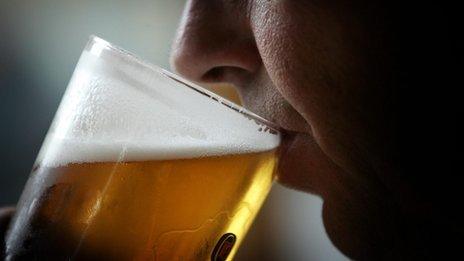Baby-boomer drug and alcohol warning
- Published

The baby-boomer generation drank more than its predecessors
There is a growing problem of drug and alcohol misuse among older people, as "baby-boomers" age, campaigners are warning.
A report from the charity DrugScope, external says more are drinking too much, and alcohol-related hospital admissions and deaths are rising.
Drug misuse was also an increasing problem in the age group, it said.
DrugScope said policy too often centred on young people and "age-appropriate" help was needed.
The oldest of the baby-boomer generation are now reaching old age, and the charity says their attitudes were formed when alcohol was becoming more widely available and socially acceptable.
In addition, they tend to have drunk more in middle age than previous generations, establishing worrying patterns for old age.
'New starters'
The European Monitoring Centre for Drugs and Drug Addiction has estimated that the number of people aged over 65 needing treatment for drug problems in Europe will double between 2001 and 2020.
The DrugScope report says about 1.4 million people aged over 65 exceed recommended drinking limits.
And between 2002 and 2010 alcohol-related hospital admissions for men aged 65 and over have risen by 136% and for women by 132%.
Office for National Statistics figures show alcohol-related deaths among the over-75s are at their highest level since 1991, when records began.
Overall, the number of people in drug treatment is declining, as is the number of people starting treatment for heroin and crack cocaine.
But the number of people aged 40 and over in treatment is rising, as is the number of people in that age group who are "new starters".
Public Health England has said this "ageing population", overwhelmingly made up of heroin users, is now becoming "one of the key features of drug treatment in England" and poses "a significant challenge for treatment services in the years ahead".
DrugScope said increased use of other illicit drugs, particularly cannabis, was also a growing problem among middle-aged and older age-groups.
'Embarrassment'
The charity says services need to be specifically targeted for older people with drug and alcohol problems.
Its chief executive, Marcus Roberts, said: "Drug and alcohol policy and practice - and the attention of the media - invariably focuses on young people.
"Drugs and alcohol issues may affect older people differently, but that does not make them less real or important. They may be a symptom of other problems, such as loneliness and isolation, caring for a partner, bereavement or the struggle to make ends meet."
He added: "This is not an issue that we can ignore.
"The barriers to older people accessing help and support need to be addressed. These can range from a belief on the part of professionals that older people can't change, to embarrassment on the part of the individual at having to ask for help.
"We also need to develop a range of age-appropriate interventions, and to make the connections between drug and alcohol issues and older-people policy, both nationally and locally.
"It's time to bring this largely 'invisible' issue into the light and to improve the support for older people with drug and alcohol issues."
Problem 'will only get worse'
Dr Tony Rao, chair of the Royal College of Psychiatrists' older people's substance misuse working group, said: "The generation of baby-boomers now progressing into later life represents a burgeoning tidal wave of substance misuse in the UK, with both hospital admissions and deaths from alcohol misuse in older people of particular concern.
"Substance misuse in older people should now be everyone's business and kept firmly on the radar of those commissioning and providing services for this growing hidden and vulnerable population."
Caroline Abrahams, charity director at Age UK, said: "Drug-taking and excessive drinking in later life are serious problems that are often linked with other issues such as bereavement, loneliness and isolation.
"Whilst the spotlight on excessive drinking generally falls on younger people, the most significant increases in alcohol related harm are actually in older age groups."
She added: "It is positive that the issues of excessive drinking and drug abuse in older age are starting to be recognised, however the problem will only get worse unless appropriate preventative and treatment services are made available."
- Published9 December 2013
- Published12 September 2010